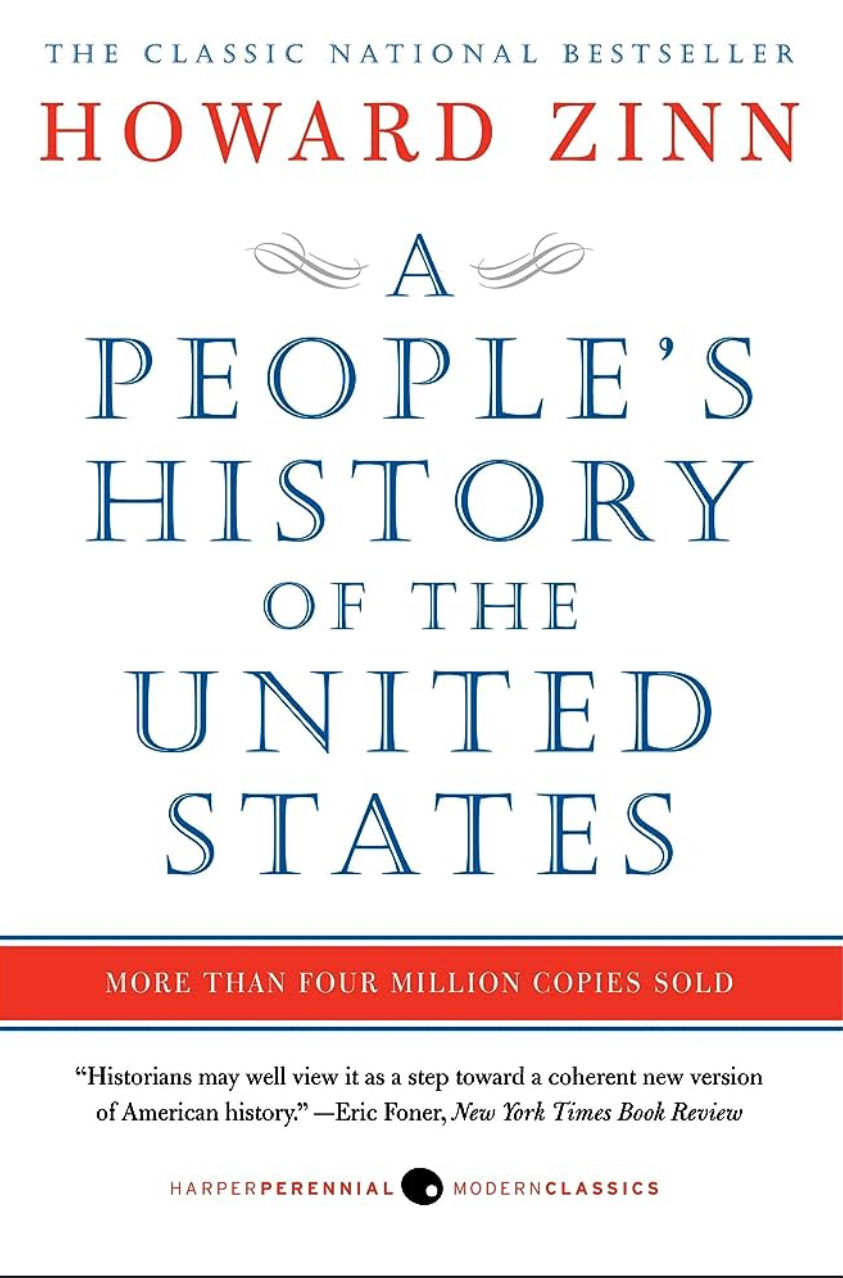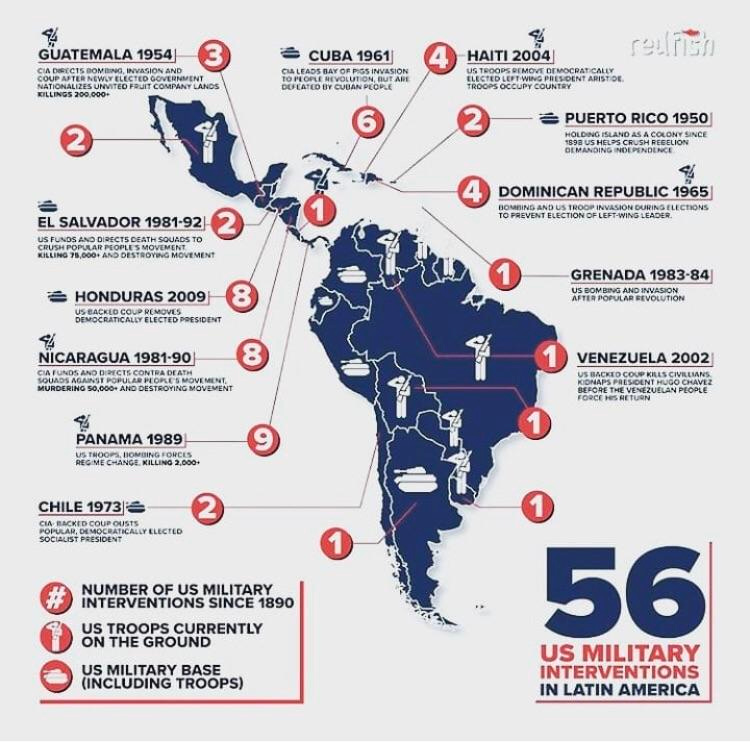I finally finished Howard Zinn’s classic A People’s History of the United States.
Reading A People’s History has been a rite of passage for leftists and teen edgelords alike for decades. As Will says in Good Will Hunting, “You wanna read a real history book, read Howard Zinn’s People’s History of the United States, that book will fuckin knock you on your ass.”
If you haven’t read it, you should. Because Will is right, it will knock you on your ass. Well, probably. The book is not a comprehensive, even-handed survey of American history from a disinterested perspective. It doesn’t attempt to be. Rather, Zinn successfully highlights one theme of American history from a singular perspective. That theme is class struggle and capitalist imperialism. And the perspective is that capitalist imperialism is bad and that the working class has consistently fought against it. Pretty simple. And purposefully one-sided.
It had been on my reading list for a very long time but I just now got around to it. I thoroughly enjoyed the continuous confirmation bias leaping off the page directly at me.
If you dislike American imperialism, capitalism, and socioeconomic oppression, then you should read this book. It’s one thing to think “workers had to fight for their rights” or “the American government has always been a tool wielded by capitalists to further enrich themselves.” It’s another thing to read about how this was practically done over previous centuries. I can already feel the need to reread it to hopefully retain more names, places, dates, and figures. It’s not that these things can’t be googled, but the ability to recall that kind of information really sets the stage for the ability to process historical change and national existential identity coherently.
If you love America and capitalism, perhaps you even think the claim that America is imperialist or that capitalism might involve oppression is nonsense or unworthy of consideration, then I think you must read this book. Reasonable people disagree on political and socioeconomic philosophies or responses to enormous and overly vague (and ultimately meaningless) statements like “America is good” or “America is bad.” Just as a proponent of socialism who cannot identify the Soviet Union as an oppressive regime has an obvious blindness, so too a proponent of capitalism, so-called “Western values,” democracy, etc. who cannot acknowledge the U.S.’s histories of oppression has an obvious blindness. And Zinn’s work is a harsh spotlight on precisely that point.
I’ll give one more apologetic for wary readers. I think it’s okay that Zinn’s text is purposefully one-sided. The teaching of history in U.S. educational institutions has been and continues to be propagandistic. And not according to the “woke agenda” as right-wing pundits would have you believe. We force students to pledge their allegiance to the nation every day, teach children patriotic songs as elementary students like “Grand Ole Flag,” and our curriculum is formed from the very same doctrinal position as one leading to those decisions. Zinn’s text, in its imbalance, only begins to draw the pendulum closer to the center for those who choose to engage this history. My suggestion is that, insofar as Zinn’s work is polemical and propagandistic, it offers a very important perspective that must be considered seriously alongside mainstream historical narratives, which are themselves biased in their own ways.
No doubt, the book is polemical and propagandistic. In fact, I characterize it as an extended Marxist thought experiment. On Marx’s view, history advances through the dialectics of class struggle. Something is “dialectical” when it undergoes a process of thesis/hypothesis (an idea, a claim, an argument, an action, etc.), antithesis (the reaction), and synthesis (the resolution and/or new hypothesis). So, for example, the state of affairs under feudal land ownership is a particular “thesis” to which peasant revolts and industrialist factories are antitheses, which culminate in the synthesis of the industrial revolution. The resulting state of affairs is then a new thesis which will draw forth a new antithesis and so on.
In this view, history primarily progresses in terms of the dialectics of class struggle; “higher” classes with concentrations of power fight against exploited “lower” classes. The fighting moves the goalposts. And the moving goalposts form what we call history. Under capitalism, according to Marx, owners and workers continuously draw new lines and fight. That is, until the working class overthrows the owners and seizes the means of production for themselves, yada yada yada… and voila, communism.
A People’s History essentially answers the question, if that’s how things really work, then how has the class struggle advanced the history of the United States, and why hasn’t that class struggle resulted in a socialist utopia by now?
Zinn’s answer is akin to a wikipedia article list of every labor dispute, worker strike, corporate and government sabotage, imperial expansion, foreign intervention, and general misdeed committed by the U.S. government and U.S. corporations. And it’s a very, very long list. As for how the socialist utopia has been kept at bay by the powers that be, Zinn’s answer is through ruthless force up until the 20th century when subtler means become predominate.
Overall, I think A People’s History is successful in establishing the thrust of its argument. After reading this book, a person must deal with the historical data of how the average person here and abroad has experienced the U.S. institutionally throughout its history and the overarching shape of that history.
A couple data points covered in the book include: Christopher Columbus’ was monstrous towards Native Americans. Lincoln was not primarily concerned with ending slavery, let alone fighting racism or white supremacy. JFK’s administration began the use of Agent Orange in Vietnam. The U.S. has supported coups to overthrow governments, including democratically elected governments, and install authoritarians friendly to U.S. economic interests across the globe.
The overarching shape of the history of the U.S. provides the resulting picture: The use of state power for capitalist interests with absolute apathy toward human misery here and abroad. The major function of the U.S. government in its domestic and foreign policy has been and continues to be the securing of capitalist(s’) interests.
It is an entirely separate question whether this aim is good or bad. And it’s a further question whether and to what extent various administrations and government activities have been successful in attaining this aim. But I think this consistent intent is a simple fact thoroughly demonstrated in A People’s History. Insofar as Zinn is successful in establishing this point, and that this accomplishment offers a much needed balance to mainstream U.S. historiographic perspectives, the general public and the popular audience of this book are in his debt.
There are problems in the book. First is the very narrow scope of the text. As I said, this is not a survey or comprehensive history of the U.S. It is a history of class struggle, which of course is only one facet of life that may be examined historically. If one were to suggest that what Zinn has written here is all that can be said or needs be said about the history of the U.S., as the title may suggest, then that would be wildly incorrect.
Another flaw in the book is Zinn’s use of anecdotes. All historiography involves the use of contemporary accounts of events and Zinn makes copious use of them here. However, these quotations are often marshaled as evidence or in support of Zinn’s arguments in a somewhat proof-texting and question-begging way. Providing anecdotal quotations or historical examples one after the other does not necessarily strengthen the argument being made.
Another criticism is a broader criticism of Marxist thought; the expected proletariat revolution has not occurred. Zinn would say this is the result of a very efficient and ever more subtle system of control developed by the U.S. government. The other author mentioned in Good Will Hunting would also agree, Manufacturing Consent’s Noam Chomsky. But this raises a couple questions: at what point do ever more “subtle” means of control simply evaporate into not a means of control - aka freedom? And does the failed expectation of inevitable revolution require a moderate change in Marxist analysis or does it indicate a more systemic problem in the analysis or mode of analysis? These questions have answers, of course, but they are not discussed by Zinn here.
Perhaps my biggest takeaway, I say this particularly mindful of people who would be resistant to Zinn’s message (and probably unwilling to read his work), is American un-exceptionalism. America is certainly not the singularly paradigmatic nation of freedom and democracy across the globe, the ambassadors of peace and justice, that it is so often claimed to be. America is also not singularly evil, the inventor of all wickedness and sole purveyor of destruction and injustice in the world. The United States is simply unexceptional. The U.S. did not invent slavery. It did institutionalize race-based chattel slavery. The U.S. did not begin the European colonization of Vietnam; France did. The U.S. did use napalm and massacre innocents. The U.S. did not create the current day problems of Israel-Palestine; Britain did. We have nearly single-handedly backed the Israeli occupation of Palestine in recent years. The U.S.S.R. had gulags. The U.S. consigned Native Americans to reservations, developed internment camps for Japanese citizens, and enforced Jim Crow laws. China currently oppresses its Uyghur population.
All forms of injustice deserve condemnation. The U.S. is not uniquely good or bad. It is a global superpower with a long history. Injustice is a consistent part of that history. A People’s History does a great job describing one aspect of it. I encourage you to read it so you too can be wicked smaaht.








The inherent vice of capitalism is the unequal sharing of blessings. The inherent virtue of socialism is the equal sharing of miseries.
- Winston Churchill